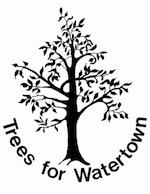
The following announcement was provided by Trees for Watertown:
In the coming decades, our New England region will be at the heart of climate change impacts. According to a 2022 University of Massachusetts report, at current CO2 emission levels, the number of 90-degree days our city sees will increase to 80 per year by the end of the century, vector-borne diseases will increase, and animal and plant species will be lost.
Of particular importance to Watertown, precipitation rates and river resulting stormwater flooding are set to rise substantially. Storms will be more intense, leading to costly home flooding and personal property loss.
In January 2020 the World Economic Forum launched the One Trillion Tree initiative. In July 2022 the Biden Administration announced the US government aims to plant over a billion trees. Along with restoring forests, a healthy established population of urban shade trees is internationally recognized as one of the most powerfully effective means for protecting us from the most punishing effects of climate change. Cities across the world are planting thousands of trees to increase their tree canopy.
However, the success of tree-planting efforts world-wide and here in Watertown depends on proper planning for the long term. Trees provide exponentially more protective ecological services when they are mature. This means it’s important to take good care of existing healthy trees, and to select, site, plant and maintain new trees carefully so that they can have long healthy lifetimes.
With this challenge in mind, Trees for Watertown invited Laurel Schwab, Watertown’s Senior Environmental Planner, to be keynote speaker at TFW’s Annual Meeting. Schwab, a member of the American Institute of Certified Planners, is in charge of overseeing Watertown’s climate change mitigation and resilience efforts. Prior to her Watertown appointment in 2019, Schwab led a range of urban planning and design efforts in Philadelphia, New Jersey, and Virginia.
Schwab will summarize Watertown’s plans to address the effects of climate change, with special emphasis on what our city and we residents can do to protect and enhance our city’s shade tree population. Among the key points she will address are:
• The City’s intention is for broad urban ecosystem expansion and restoration, acknowledging that trees don’t thrive in isolation.
• Watertown’s efforts are but one piece of regional and statewide action to deploy trees and nature to enhance climate resilience.
• Planting a new tree in your yard may feel like a small gesture but it will have profound impact if repeated across our community.
Resilient Watertown, Watertown’s comprehensive climate and energy plan, reflects this balance. One of the key action areas, Natural Resources, envisions a tree-based transformation of the city by introducing pocket parks in neighborhoods lacking green space, increasing natural green open space, promoting biodiversity, and supporting a major increase in street tree plantings. The plan backs this commitment with support for an enforceable tree ordinance.
Increasing and protecting Watertown’s tree population will address not only flooding concerns but issues of excess heat and livability. These tree-based efforts are carefully balanced within an overall approach designed to reduce the city’s greenhouse gas emissions and enhance preparedness.
From building efficiency to street transportation infrastructure to waste management, trees are part of a cohesive effort to prepare the city for a hotter, wetter future.
This year’s Trees for Watertown Annual Meeting marks this volunteer organization’s 38th year. Since 1985, TFW has worked to preserve and enhance Watertown’s urban tree canopy through advocacy, public education, and hands-on projects. This meeting, with Schwab’s keynote address, will take place from 1 to 3 p.m. on Saturday, September 30th at the Watertown Free Public Library. All members of the public are welcome to attend.